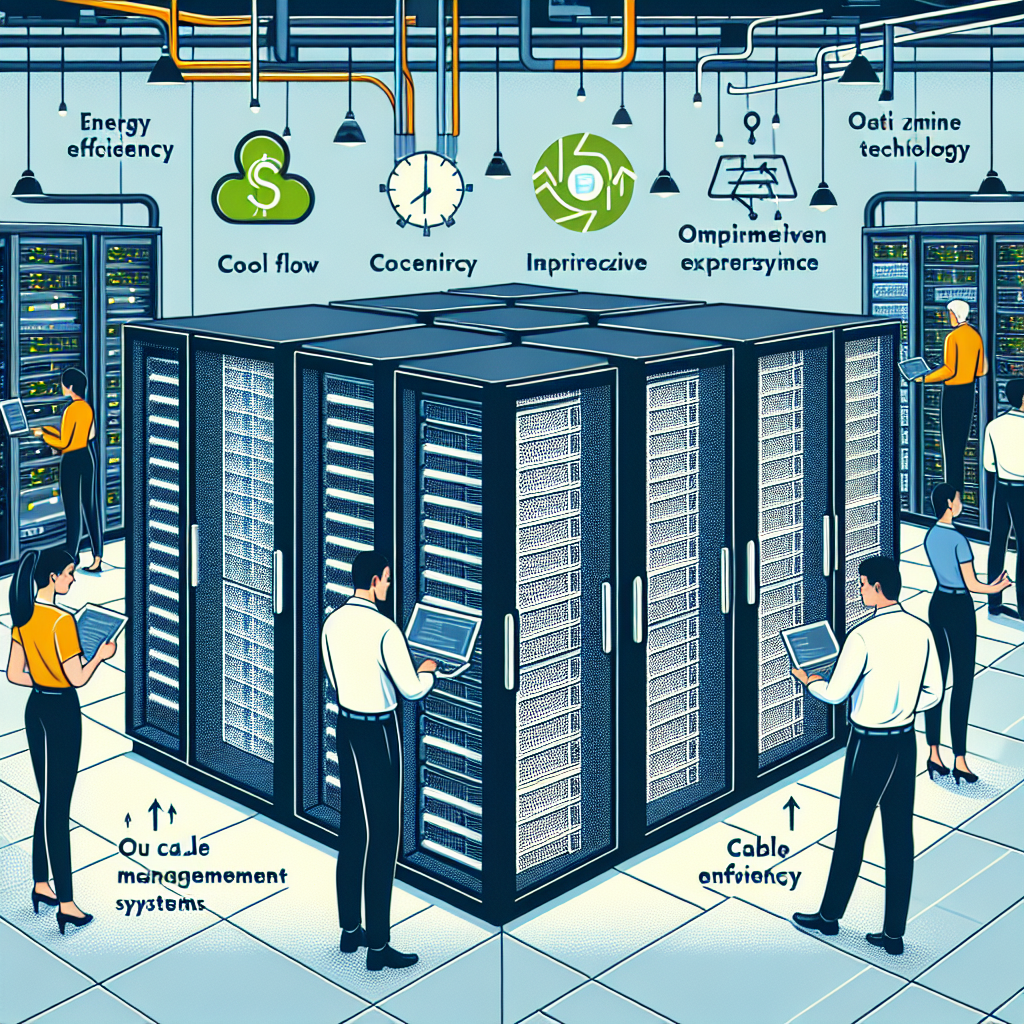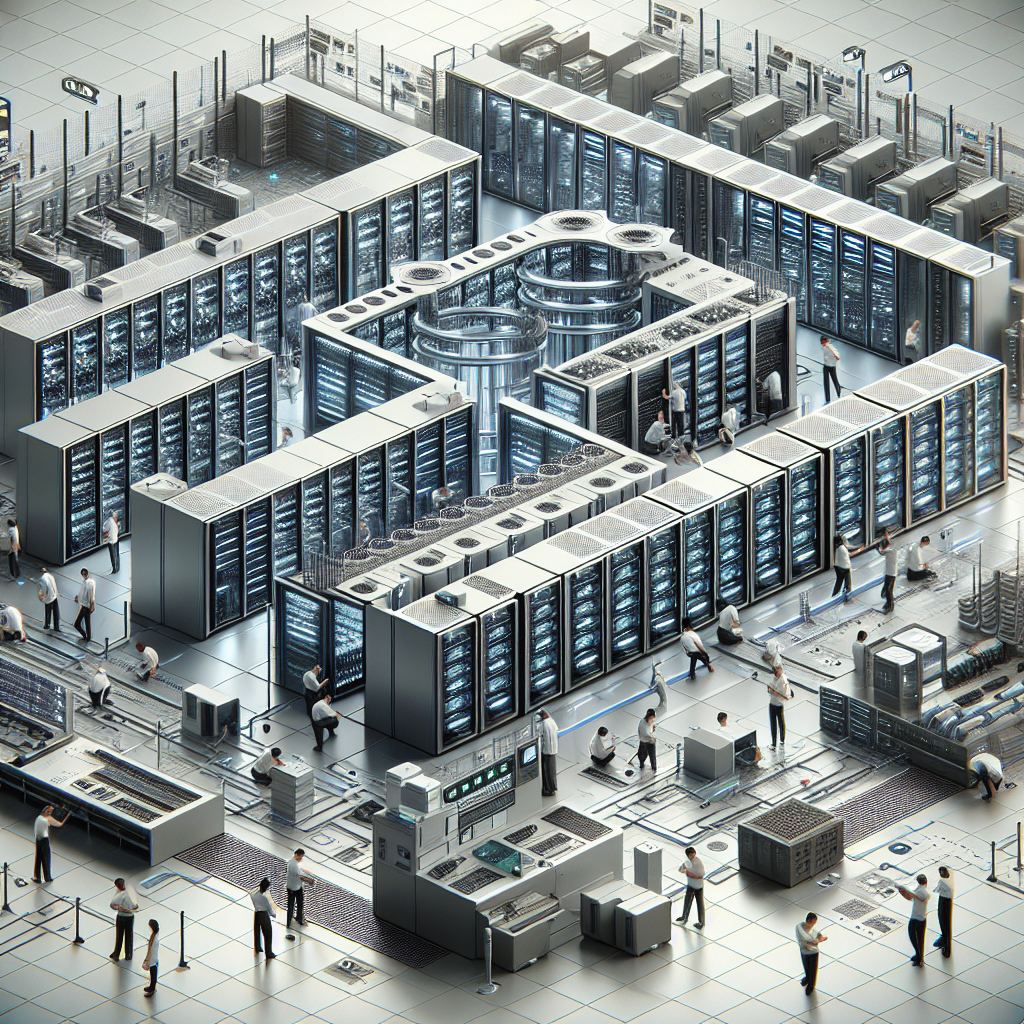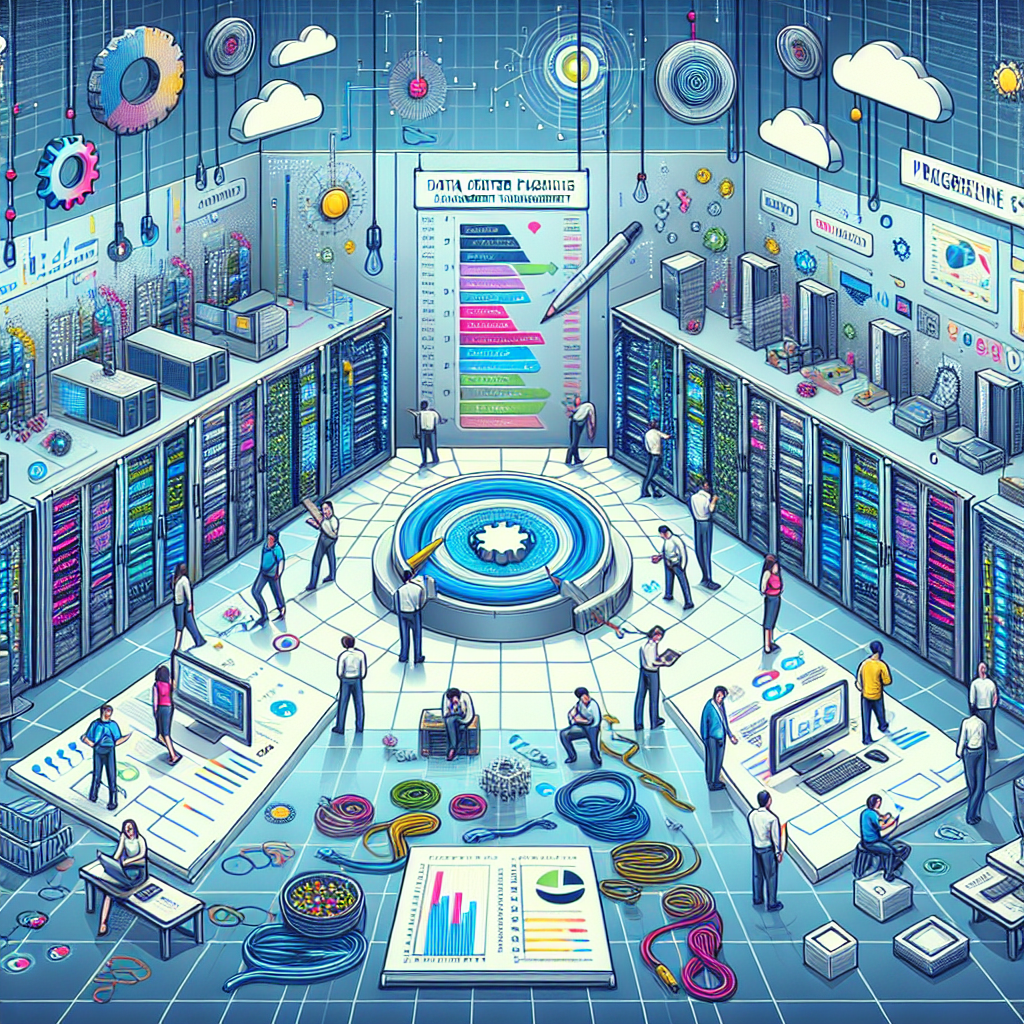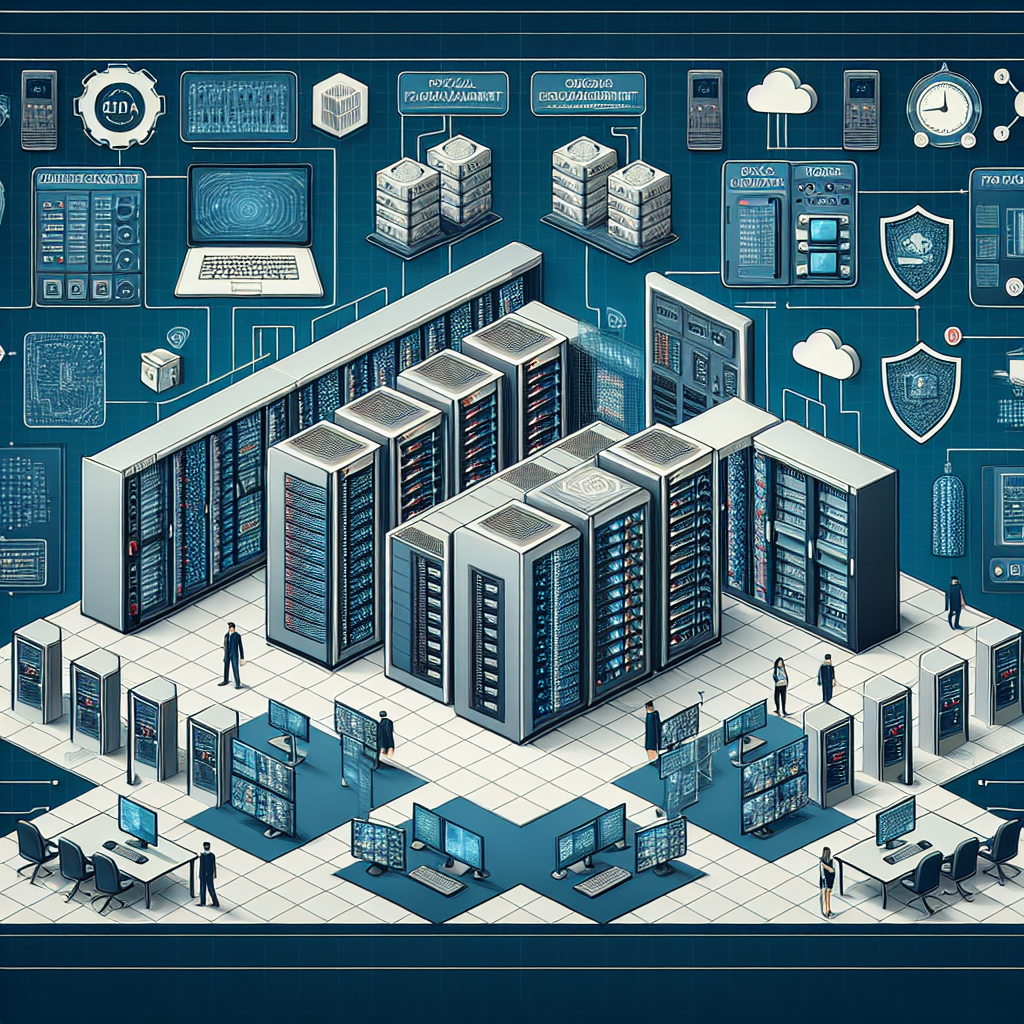Your cart is currently empty!
Tag: Data Center Facilities Management

Optimizing Data Center Facilities for Peak Performance: Tips and Techniques
In today’s digital age, data centers play a crucial role in storing and processing the vast amounts of information generated by businesses and individuals. As such, it is essential for data center facilities to be optimized for peak performance in order to ensure smooth operations and maximize efficiency. Here are some tips and techniques to help achieve this goal:1. Efficient Cooling Systems: One of the key factors in optimizing data center facilities is ensuring that the cooling systems are efficient and effective. Proper airflow and temperature control are essential to prevent overheating and ensure that the equipment operates at its optimal performance levels. Consider implementing hot aisle/cold aisle containment systems and utilizing energy-efficient cooling technologies to improve cooling efficiency.
2. Regular Maintenance and Monitoring: Regular maintenance and monitoring of data center equipment are essential to identify and address potential issues before they escalate into larger problems. Implementing a comprehensive maintenance schedule and using monitoring tools to track performance metrics can help prevent downtime and ensure that the facility operates at peak performance levels.
3. Power Management: Power management is another critical aspect of optimizing data center facilities. Implementing energy-efficient power distribution systems, utilizing virtualization technologies to consolidate servers, and implementing power-saving features on equipment can help reduce energy consumption and lower operating costs. Consider deploying renewable energy sources, such as solar or wind power, to further reduce the facility’s carbon footprint.
4. Redundancy and Backup Systems: To ensure uninterrupted operations and protect against data loss, it is essential to implement redundancy and backup systems in data center facilities. Utilize redundant power supplies, backup generators, and uninterruptible power supply (UPS) systems to ensure continuity of operations in the event of a power outage. Implementing redundant networking and storage systems can also help prevent data loss and ensure data availability.
5. Scalability and Flexibility: Data center facilities should be designed with scalability and flexibility in mind to accommodate future growth and changing business needs. Implement modular designs and flexible infrastructure solutions that can easily be expanded or reconfigured to meet evolving requirements. Consider utilizing cloud services and colocation facilities to scale resources as needed and optimize performance.
In conclusion, optimizing data center facilities for peak performance is essential to ensure smooth operations, maximize efficiency, and reduce downtime. By implementing efficient cooling systems, regular maintenance and monitoring, power management strategies, redundancy and backup systems, and scalability and flexibility measures, businesses can achieve optimal performance levels in their data center facilities. By following these tips and techniques, organizations can ensure that their data center facilities are well-equipped to meet the demands of today’s digital landscape.

The Importance of Data Center Facilities Management in Ensuring Efficiency and Security
Data centers play a crucial role in the operations of businesses and organizations, serving as the backbone of their IT infrastructure. As the demand for data storage and processing continues to grow, the need for efficient and secure data center facilities management becomes increasingly important.Data center facilities management involves overseeing the physical infrastructure of a data center, including power and cooling systems, security measures, and equipment maintenance. By ensuring that these facilities are properly managed, businesses can optimize their data center operations, improve efficiency, and enhance security.
Efficiency is key in data center operations, as any downtime or inefficiencies can result in significant financial losses for businesses. By implementing efficient data center facilities management practices, organizations can minimize downtime, increase the reliability of their systems, and reduce operational costs. This includes monitoring power usage, optimizing cooling systems, and implementing energy-efficient technologies to maximize the efficiency of the data center.
Security is another critical aspect of data center facilities management. Data centers house sensitive and confidential information, making them prime targets for cyberattacks and security breaches. By implementing robust security measures, such as access controls, surveillance systems, and fire suppression systems, businesses can protect their data from unauthorized access and ensure compliance with data protection regulations.
Furthermore, data center facilities management plays a crucial role in disaster recovery and business continuity planning. By implementing redundancy measures, backup systems, and disaster recovery protocols, organizations can ensure that their data remains secure and accessible in the event of a natural disaster or system failure.
In conclusion, data center facilities management is essential for ensuring the efficiency and security of data center operations. By implementing best practices in facilities management, businesses can optimize their data center operations, reduce downtime, enhance security, and improve overall performance. Investing in efficient and secure data center facilities management is crucial for businesses looking to stay competitive in today’s digital landscape.

Optimizing Data Center Infrastructure with Effective Facilities Management
In today’s digital age, data centers play a crucial role in storing and managing the vast amounts of data generated by businesses and individuals. As the demand for data center services continues to grow, it is essential for organizations to optimize their data center infrastructure to ensure efficiency, reliability, and cost-effectiveness. One key aspect of achieving this optimization is effective facilities management.Facilities management in a data center involves the maintenance and operation of the physical infrastructure, including power and cooling systems, server racks, networking equipment, and security systems. By effectively managing these facilities, organizations can improve the performance, reliability, and energy efficiency of their data center operations.
One important aspect of facilities management in a data center is ensuring that power and cooling systems are operating at peak efficiency. Data centers consume a significant amount of energy, primarily for powering servers and cooling equipment. By implementing energy-efficient technologies and practices, such as using high-efficiency power supplies and cooling systems, organizations can reduce their energy consumption and lower their operating costs.
In addition to energy efficiency, effective facilities management also involves monitoring and maintaining the physical security of the data center. This includes implementing access controls, surveillance systems, and other security measures to protect the data center from unauthorized access and physical threats. By ensuring that security measures are in place and functioning properly, organizations can safeguard their valuable data and prevent potential security breaches.
Furthermore, facilities management in a data center also involves optimizing the layout and design of the physical infrastructure to improve airflow and reduce hot spots. Proper airflow management is crucial for maintaining optimal operating temperatures for servers and networking equipment, as excessive heat can lead to equipment failure and downtime. By implementing best practices for airflow management, such as arranging server racks in hot and cold aisles and using containment systems to separate hot and cold air streams, organizations can improve the overall efficiency and reliability of their data center operations.
Overall, effective facilities management is essential for optimizing data center infrastructure and ensuring the smooth and efficient operation of data center operations. By implementing energy-efficient technologies, maintaining physical security measures, and optimizing airflow management, organizations can improve the performance, reliability, and cost-effectiveness of their data center operations. In today’s competitive business environment, investing in effective facilities management is a strategic decision that can help organizations stay ahead of the curve and meet the growing demands for data center services.

Creating a Sustainable Data Center: The Role of Facilities Management
Data centers play a critical role in the operations of businesses and organizations by storing, managing, and processing large amounts of data. With the increasing reliance on technology and data, the demand for data centers is growing rapidly. However, the environmental impact of data centers is becoming a growing concern, as they consume vast amounts of energy and produce significant amounts of carbon emissions.Facilities management plays a crucial role in creating a sustainable data center by implementing strategies to reduce energy consumption, minimize waste, and lower carbon emissions. By focusing on energy efficiency, waste management, and sustainable practices, facilities managers can help to mitigate the environmental impact of data centers and contribute to a more sustainable future.
One of the key strategies for creating a sustainable data center is to improve energy efficiency. Data centers are known for their high energy consumption, as they require large amounts of electricity to power servers, cooling systems, and other equipment. By implementing energy-efficient technologies, such as virtualization, energy-efficient servers, and airflow optimization, facilities managers can reduce energy consumption and lower operating costs.
In addition to improving energy efficiency, facilities managers can also implement strategies to minimize waste and promote recycling. Data centers generate a significant amount of electronic waste, such as old servers, networking equipment, and cables. By properly recycling and disposing of electronic waste, facilities managers can reduce the environmental impact of data centers and prevent harmful chemicals from entering the environment.
Furthermore, facilities managers can also promote sustainable practices, such as using renewable energy sources, implementing water conservation measures, and reducing carbon emissions. By investing in renewable energy sources, such as solar or wind power, data centers can reduce their reliance on fossil fuels and lower their carbon footprint. Additionally, implementing water-saving technologies, such as cooling towers and water recycling systems, can help to conserve water and reduce the environmental impact of data centers.
Overall, facilities management plays a critical role in creating a sustainable data center by implementing strategies to improve energy efficiency, minimize waste, and promote sustainable practices. By focusing on sustainability, facilities managers can help to reduce the environmental impact of data centers and contribute to a more sustainable future. With the increasing demand for data centers, it is essential for facilities managers to prioritize sustainability and implement environmentally friendly practices to ensure the long-term viability of data centers.

Maximizing ROI: The Benefits of Strategic Data Center Facilities Management
In today’s digital age, data centers play a crucial role in the operations of businesses across various industries. These facilities are responsible for storing, processing, and managing vast amounts of data that are essential for the day-to-day operations of organizations. As such, it is imperative for businesses to maximize the return on investment (ROI) of their data center facilities through strategic management.One key aspect of maximizing ROI in data center facilities is through effective management. Strategic data center facilities management involves the efficient utilization of resources, optimizing performance, minimizing downtime, and ensuring the overall reliability and security of the data center. By implementing strategic management practices, businesses can derive several benefits that contribute to maximizing ROI.
One of the primary benefits of strategic data center facilities management is cost savings. By efficiently managing resources such as power, cooling, and space, businesses can reduce operational expenses associated with running a data center. Through proper capacity planning and resource allocation, organizations can avoid overspending on unnecessary infrastructure and ensure optimal performance at a lower cost.
Moreover, strategic data center facilities management can also help enhance the overall performance and reliability of the data center. By implementing proactive maintenance and monitoring practices, businesses can prevent downtime and ensure continuous operations. This not only improves the efficiency of the data center but also enhances the overall productivity of the organization.
Additionally, strategic data center facilities management can help businesses mitigate risks and enhance security. By implementing robust security measures, conducting regular audits, and ensuring compliance with industry regulations, organizations can safeguard their data and protect it from potential threats. This not only helps maintain the integrity of the data center but also builds trust with customers and partners.
Furthermore, strategic data center facilities management can also contribute to the scalability and flexibility of the data center. By implementing modular infrastructure and flexible design principles, businesses can easily scale their operations to accommodate growth and changing business needs. This enables organizations to adapt to evolving technologies and market demands without disrupting operations or incurring excessive costs.
In conclusion, maximizing ROI through strategic data center facilities management offers numerous benefits for businesses. From cost savings and improved performance to enhanced security and scalability, effective management practices can help organizations optimize the value of their data center investments. By investing in strategic management and adopting best practices, businesses can ensure the long-term success and sustainability of their data center facilities.

Key Trends in Data Center Facilities Management for 2021 and Beyond
In recent years, data center facilities management has become increasingly important as businesses rely more heavily on technology and data storage. With the rapid growth of data usage and the increasing complexity of data center infrastructure, it is crucial for organizations to stay ahead of key trends in data center facilities management to ensure efficiency, security, and reliability.One of the key trends in data center facilities management for 2021 and beyond is the shift towards sustainable practices. As businesses face pressure to reduce their carbon footprint and operate in an environmentally responsible manner, data centers are increasingly focusing on energy efficiency and renewable energy sources. This includes implementing innovative cooling technologies, such as liquid cooling and free cooling, to reduce energy consumption and improve overall sustainability.
Another important trend in data center facilities management is the increasing use of automation and artificial intelligence (AI) technologies. With the growing complexity of data center operations, automation tools and AI algorithms are being used to streamline processes, optimize performance, and increase efficiency. This includes predictive maintenance tools that can anticipate and address potential issues before they impact operations, as well as AI-powered analytics that can provide valuable insights into data center performance and resource utilization.
In addition, data center facilities management is also seeing a trend towards greater emphasis on security and compliance. With the rise of cyber threats and data breaches, organizations are investing in advanced security measures, such as biometric access controls, physical security enhancements, and data encryption technologies, to protect their sensitive data and ensure regulatory compliance. This includes implementing robust disaster recovery and business continuity plans to mitigate the risk of downtime and data loss.
Furthermore, the ongoing digital transformation of businesses is driving the need for data center facilities management to be more agile and flexible. As organizations adopt cloud computing, edge computing, and hybrid IT environments, data centers are evolving to support these new technologies and adapt to changing business requirements. This includes the adoption of modular data center designs, scalable infrastructure solutions, and software-defined networking to enable greater flexibility and responsiveness to changing demands.
Overall, data center facilities management is undergoing significant changes to meet the evolving needs of businesses in 2021 and beyond. By focusing on sustainability, automation, security, compliance, and agility, organizations can ensure that their data centers are equipped to handle the demands of the digital age and support their business growth and success.

The Role of Data Center Facilities Management in Ensuring Data Security
Data security is a critical concern for businesses of all sizes in today’s digital age. With the increasing amount of data being generated and stored, it is essential for organizations to have robust measures in place to protect their sensitive information from cyber threats. One crucial aspect of ensuring data security is the management of data center facilities.Data center facilities management plays a vital role in safeguarding the integrity and confidentiality of data stored in these facilities. Data centers are centralized locations where organizations store and process their data, and they are typically equipped with advanced security measures to prevent unauthorized access and data breaches.
One of the primary responsibilities of data center facilities management is to ensure the physical security of the data center. This includes implementing access control measures, such as biometric scanners and security badges, to restrict entry to authorized personnel only. Additionally, surveillance cameras and alarms are often installed to monitor and detect any suspicious activities within the facility.
In addition to physical security, data center facilities management also plays a crucial role in maintaining the operational integrity of the data center. This includes monitoring and managing the temperature, humidity, and power supply within the facility to ensure that the servers and other equipment are functioning optimally. Any disruptions to these factors can lead to data loss or corruption, making it essential for facilities management to have contingency plans in place to mitigate risks.
Furthermore, data center facilities management is responsible for implementing and maintaining fire suppression systems, backup power generators, and redundant cooling systems to ensure that the data center remains operational in the event of a disaster or power outage. These measures are essential for protecting the data stored within the facility and ensuring business continuity in the face of unforeseen events.
Another critical aspect of data center facilities management in ensuring data security is compliance with industry regulations and standards. Data centers are often subject to strict regulations, such as the General Data Protection Regulation (GDPR) in Europe or the Health Insurance Portability and Accountability Act (HIPAA) in the United States. Facilities management must ensure that the data center meets these regulatory requirements to avoid fines and legal repercussions.
In conclusion, data center facilities management plays a crucial role in ensuring data security by implementing physical security measures, maintaining operational integrity, and complying with industry regulations. By investing in robust facilities management practices, organizations can protect their sensitive data and maintain the trust of their customers and stakeholders.

Optimizing Data Center Efficiency through Facilities Management
In today’s digital age, data centers play a crucial role in storing, processing, and managing vast amounts of data. With the increasing demand for data storage and processing capabilities, data center efficiency has become a top priority for organizations looking to maximize their resources and reduce operational costs. One key aspect of optimizing data center efficiency is through effective facilities management.Facilities management in a data center involves the maintenance and operation of the physical infrastructure that houses servers, storage devices, networking equipment, and cooling systems. By implementing best practices in facilities management, organizations can improve the performance, reliability, and energy efficiency of their data centers.
One of the primary goals of facilities management is to ensure that the data center operates at its optimal capacity while minimizing energy consumption. This can be achieved through a variety of strategies, such as implementing energy-efficient cooling systems, optimizing airflow and temperature controls, and utilizing power management tools to monitor and control energy usage.
Another important aspect of facilities management is ensuring the reliability and availability of critical infrastructure components. This includes conducting regular maintenance checks, monitoring equipment performance, and implementing redundancy measures to prevent downtime and data loss. By proactively managing the physical assets of the data center, organizations can minimize the risk of system failures and ensure continuous operations.
In addition to improving energy efficiency and reliability, facilities management also plays a key role in enhancing security and compliance in the data center. This includes implementing physical security measures, such as access controls and surveillance systems, as well as ensuring compliance with industry regulations and standards for data protection.
Overall, effective facilities management is essential for optimizing data center efficiency and ensuring the smooth operation of critical infrastructure. By implementing best practices in facilities management, organizations can reduce operational costs, improve performance and reliability, and enhance security and compliance in their data centers. As the demand for data storage and processing continues to grow, investing in facilities management is essential for organizations looking to maximize the value of their data center resources.

The Importance of Data Center Facilities Management in the Modern Business World
In today’s digital age, data has become one of the most valuable assets for businesses. The ability to collect, store, and analyze data is crucial for making informed decisions and gaining a competitive edge in the market. This is where data center facilities management plays a critical role.Data center facilities management is the practice of overseeing and maintaining the physical infrastructure of a data center. This includes ensuring that the data center is operating efficiently, securely, and reliably. With the increasing reliance on technology and data, the importance of data center facilities management in the modern business world cannot be understated.
One of the key reasons why data center facilities management is essential is to ensure the availability and reliability of data. Downtime can be extremely costly for businesses, leading to lost revenue, damaged reputation, and decreased productivity. By implementing proper facilities management practices, businesses can minimize the risk of downtime and ensure that their data is always accessible when needed.
Security is another crucial aspect of data center facilities management. With cyber threats on the rise, businesses need to ensure that their data is protected from unauthorized access, theft, and other security breaches. Data center facilities management involves implementing robust security measures, such as access control systems, surveillance cameras, and fire suppression systems, to protect sensitive information and prevent data breaches.
Efficiency is also a key consideration in data center facilities management. Data centers consume a significant amount of energy, and inefficient operations can lead to unnecessary costs and environmental impact. By optimizing resources, implementing energy-efficient technologies, and monitoring performance, businesses can reduce their carbon footprint and lower operating costs.
Furthermore, data center facilities management plays a crucial role in compliance with regulations and industry standards. Many industries have strict requirements for data security and privacy, and businesses must adhere to these regulations to avoid legal repercussions. By implementing proper facilities management practices, businesses can ensure that their data center meets all necessary compliance requirements.
In conclusion, data center facilities management is a critical component of modern business operations. By ensuring the availability, security, efficiency, and compliance of data centers, businesses can leverage their data assets to drive growth and success. Investing in data center facilities management is not only essential for protecting valuable data but also for staying competitive in today’s fast-paced business environment.

The Future of Data Center Facilities Management: Challenges and Opportunities
As technology continues to advance at a rapid pace, the future of data center facilities management is facing both challenges and opportunities. Data centers are critical infrastructure that house and manage the computing resources necessary for businesses to operate efficiently. With the increasing reliance on data and the exponential growth of digital information, the management of data center facilities is becoming more complex and demanding.One of the key challenges facing data center facilities management is the need to keep up with the ever-increasing demand for computing power and storage capacity. As businesses continue to digitize their operations and rely more heavily on data-driven processes, data centers must constantly expand and upgrade their infrastructure to meet these growing needs. This requires significant investment in hardware, software, and energy resources, as well as skilled personnel to manage and maintain the facilities.
Another challenge is the need to ensure the security and reliability of data center facilities. With cyber threats becoming more sophisticated and frequent, data centers must implement robust security measures to protect sensitive information and prevent downtime. This includes implementing firewalls, encryption, access controls, and monitoring systems to detect and respond to potential threats in real-time.
In addition to these challenges, data center facilities management also presents opportunities for innovation and efficiency. With the advent of new technologies such as artificial intelligence, machine learning, and Internet of Things (IoT) devices, data centers can optimize their operations and improve performance. For example, AI-powered predictive analytics can help data center managers anticipate and address potential issues before they escalate, while IoT sensors can provide real-time data on energy consumption and equipment performance to optimize resource allocation.
Furthermore, the adoption of cloud computing and virtualization technologies is enabling data centers to become more agile and scalable. By migrating workloads to the cloud and consolidating servers through virtualization, data centers can reduce costs, improve flexibility, and increase efficiency. This trend towards hybrid cloud environments is also enabling data centers to offer new services and solutions to meet the evolving needs of businesses.
In conclusion, the future of data center facilities management is both challenging and full of opportunities. As businesses continue to rely on data and digital technologies to drive their operations, data centers must evolve and adapt to meet these demands. By investing in the latest technologies, implementing robust security measures, and optimizing their operations, data center facilities can continue to play a crucial role in supporting the digital economy.
